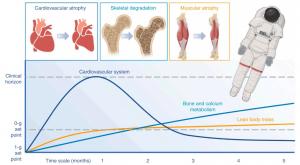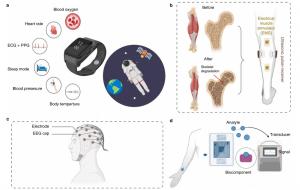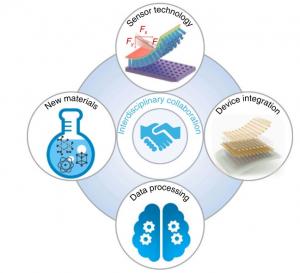How Flexible Wearables Protect Astronauts' Health in Space
HI, UNITED STATES, April 16, 2025 /EINPresswire.com/ -- In the harsh environment of space—where microgravity, cosmic radiation, and isolation pose unprecedented health risks—flexible wearable devices have emerged as critical tools. These "smart skins" continuously monitor astronauts' vital signs, revolutionizing space medicine.
A review published recently in Wearable Electronics examines the current applications and persistent challenges of flexible wearable technologies in aerospace medicine. As human space exploration progresses toward extended-duration missions, the imperative for real-time monitoring of astronauts' physiological and psychological well-being has become increasingly critical. The unique space environment characterized by microgravity conditions, cumulative radiation exposure, and extreme thermal fluctuations presents multifaceted health risks to crew members.
Flexible wearable systems, equipped with multimodal sensor arrays, enable comprehensive and continuous health surveillance. These integrated platforms include inertial measurement units, biosignal electrodes, and environmental detectors, among others. They have proven to be indispensable for early anomaly detection in cardiopulmonary functions, neuromuscular performance, and circadian rhythm regulation, thereby facilitating timely personalized countermeasures.
Nonetheless, despite recent advancements in materials science and miniaturized electronics, three notable technical barriers persist: 1) device reliability under combined space stressors, 2) secure data management protocols addressing confined spacecraft privacy concerns, and 3) multi-parametric data fusion challenges involving temporal-spatial synchronization of heterogeneous bio-signals.
Breakthrough development trajectories emphasize future research in the field of flexible wearable devices, particularly for astronaut applications, will focus on several key areas and their interdisciplinary collaborations. These research areas will cover advanced materials science, new materials and sensor technology, intelligent algorithms, data processing and device integration. Interestingly, the development of technologies in the field will still rely on material innovation, the creation of intelligent algorithms, the improvement of user experience and interdisciplinary cooperation. In particular, continuous development and maturity of the technology, together with flexible electronic devices, will play an important role in enhancing astronauts' health monitoring capabilities and promoting the progress of human space exploration in the future.
References
DOI
10.1016/j.wees.2024.12.007
Originlal Source URL
https://doi.org/10.1016/j.wees.2024.12.007
Funding information
This work was supported by the National Social Science Foundation of China (nos. 20BTY029 and 52003101), the Space Medical Experiment Project of CMSP (HYZHXMH01008) and the China Postdoctoral Science Foundation (2020M673052 and 2021T140270).
Lucy Wang
BioDesign Research
email us here
Legal Disclaimer:
EIN Presswire provides this news content "as is" without warranty of any kind. We do not accept any responsibility or liability for the accuracy, content, images, videos, licenses, completeness, legality, or reliability of the information contained in this article. If you have any complaints or copyright issues related to this article, kindly contact the author above.
Complete Roofing Solutions Highlights Long-Term Value of Roof Maintenance Plans
Non-Surgical Robotic Laser Spinal Decompression Offers Life-Saving Hope to Chronic Pain Sufferers in Ottawa
Bikago Motorbike and Scooter Rentals Achieves TripAdvisor Top 10 Global Tourism Ranking
Więcej ważnych informacji
 Jedynka Newserii
Jedynka Newserii

 Jedynka Newserii
Jedynka Newserii

Handel

Mercosur to tylko wierzchołek góry lodowej. UE ma ponad 40 umów handlowych, które mogą destabilizować rynek rolny
Umowa handlowa między UE a krajami Mercosur może znacząco zaburzyć konkurencję na rynku rolnym i osłabić pozycję unijnych, w tym polskich, producentów – ostrzegają rolnicy i producenci żywności. Umowie sprzeciwia się część krajów unijnych, które domagają się klauzuli ochronnych oraz limitów importowych. – Problemem jest jednak nie tylko ta konkretna umowa. Chodzi o cały system wolnego handlu, który się kumuluje z dziesiątek innych porozumień – podkreśla Andrzej Gantner, wiceprezes Polskiej Federacji Producentów Żywności.
Firma
Dzięki zdalnej weryfikacji tożsamości z wykorzystaniem AI firmy zminimalizowały liczbę oszustw. Rozwiązania wykorzystuje głównie sektor finansowy

Z najnowszych danych Eurostatu wynika, że w 2024 roku 5,9 proc. polskich firm korzystało z rozwiązań z zakresu sztucznej inteligencji. W 2023 roku był to odsetek na poziomie 3,67 proc. Wciąż jednak jest to wynik poniżej średniej unijnej, która wyniosła 13,48 proc. Jednym z obszarów, który cieszy się coraz większym zainteresowaniem wśród przedsiębiorców, jest weryfikacja tożsamości przez AI, zwłaszcza w takich branżach jak bankowość, ubezpieczenia czy turystyka. Jej zastosowanie ma na celu głównie przeciwdziałać oszustwom i spełniać wymogi regulacyjne.
Prawo
Daniel Obajtek: Własne wydobycie i operacyjne magazyny to filary bezpieczeństwa. Zgoda na magazyny gazu poza krajem to rezygnacja z suwerenności energetycznej

Były prezes Orlenu ostrzega przed zmianami w ustawie o zapasach ropy naftowej, produktów naftowych i gazu ziemnego. Jego zdaniem przygotowana przez rząd nowelizacja tzw. ustawy magazynowej i ujednolicanie unijnej polityki energetycznej to zagrożenie dla bezpieczeństwa energetycznego Polski. W jego opinii tylko silna spółka narodowa, własne wydobycie, krajowe magazyny i zbilansowany miks energetyczny zapewnią Polsce bezpieczeństwo i konkurencyjność.
Partner serwisu
Szkolenia

Akademia Newserii
Akademia Newserii to projekt, w ramach którego najlepsi polscy dziennikarze biznesowi, giełdowi oraz lifestylowi, a także szkoleniowcy z wieloletnim doświadczeniem dzielą się swoją wiedzą nt. pracy z mediami.







![Nestlé w Polsce podsumowuje wpływ na krajową gospodarkę. Firma wygenerowała 0,6 proc. polskiego PKB [DEPESZA]](https://www.newseria.pl/files/1097841585/fabryka-nesquik_1,w_85,r_png,_small.png)



.gif)

 |
| |
| |
|